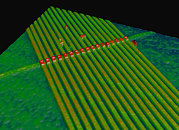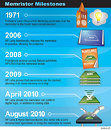- Joined
- Oct 9, 2007
- Messages
- 47,449 (7.50/day)
- Location
- Hyderabad, India
| System Name | RBMK-1000 |
|---|---|
| Processor | AMD Ryzen 7 5700G |
| Motherboard | ASUS ROG Strix B450-E Gaming |
| Cooling | DeepCool Gammax L240 V2 |
| Memory | 2x 8GB G.Skill Sniper X |
| Video Card(s) | Palit GeForce RTX 2080 SUPER GameRock |
| Storage | Western Digital Black NVMe 512GB |
| Display(s) | BenQ 1440p 60 Hz 27-inch |
| Case | Corsair Carbide 100R |
| Audio Device(s) | ASUS SupremeFX S1220A |
| Power Supply | Cooler Master MWE Gold 650W |
| Mouse | ASUS ROG Strix Impact |
| Keyboard | Gamdias Hermes E2 |
| Software | Windows 11 Pro |
HP today announced that it has entered into a joint development agreement with Hynix Semiconductor Inc., a world-leading memory supplier, to bring memristor, a new circuit element first intentionally demonstrated in HP Labs, to market in future memory products. Memristors require less energy to operate, are faster than present solid-state storage technologies and can retain information even when power is off. The memristor, short for "memory resistor," was postulated to be the fourth basic circuit element by Prof. Leon Chua of the University of California at Berkeley in 1971 and first intentionally reduced to practice by researchers in HP Labs, the company's central research arm, in 2006.
Earlier this year, HP announced the discovery that the memristor also can perform logic, showing that memristor-based devices could change the standard paradigm of computing by enabling computation to one day be performed in chips where data is stored, rather than on a specialized central processing unit.

Bringing research to market
Joint development agreements are one way in which HP partners with others to leverage its intellectual property, which includes a portfolio of more than 30,000 patents. By collaborating with others to bring new technologies to market through intellectual property licenses and other technology transfer agreements, HP helps create new markets and generates a return on its research and development investment.

Supporting quotes
"The memristor has storage capacity abilities many times greater than what competing technologies offer. By adopting HP's memristor technology we can deliver new, energy-efficient products to our customers more quickly," says Dr. S.W. Park, executive vice president and chief technology officer, Hynix.
"This agreement brings together HP's core intellectual property and a first-rate supplier with the capacity to bring this innovation to market in world-class memory on a mass scale. It is the most recent example of HP's ability to drive product innovation from the Labs out into the commercial world. This is discovery and invention with clear purpose, which differentiates HP and reinforces the value of our research enterprise to HP as a whole," says Stan Williams, senior fellow, HP, and founding director, Information and Quantum Systems Laboratory, HP Labs.
Highlights
View at TechPowerUp Main Site
Earlier this year, HP announced the discovery that the memristor also can perform logic, showing that memristor-based devices could change the standard paradigm of computing by enabling computation to one day be performed in chips where data is stored, rather than on a specialized central processing unit.

Bringing research to market
Joint development agreements are one way in which HP partners with others to leverage its intellectual property, which includes a portfolio of more than 30,000 patents. By collaborating with others to bring new technologies to market through intellectual property licenses and other technology transfer agreements, HP helps create new markets and generates a return on its research and development investment.

Supporting quotes
"The memristor has storage capacity abilities many times greater than what competing technologies offer. By adopting HP's memristor technology we can deliver new, energy-efficient products to our customers more quickly," says Dr. S.W. Park, executive vice president and chief technology officer, Hynix.
"This agreement brings together HP's core intellectual property and a first-rate supplier with the capacity to bring this innovation to market in world-class memory on a mass scale. It is the most recent example of HP's ability to drive product innovation from the Labs out into the commercial world. This is discovery and invention with clear purpose, which differentiates HP and reinforces the value of our research enterprise to HP as a whole," says Stan Williams, senior fellow, HP, and founding director, Information and Quantum Systems Laboratory, HP Labs.
Highlights
- The two companies will jointly develop new materials and process integration technology to transfer the memristor technology from research to commercial development in the form of Resistive Random Access Memory (ReRAM). Hynix will implement the memristor technology in its research and development fab.
- ReRAM is non-volatile memory with low power consumption that holds the potential to replace Flash memory currently used in mobile phones and MP3 players. It also has the potential to serve as a universal storage medium - that is, memory that can behave as Flash, DRAM or even a hard drive.
View at TechPowerUp Main Site


 (because we all know we would
(because we all know we would  ).
).


 .
.


